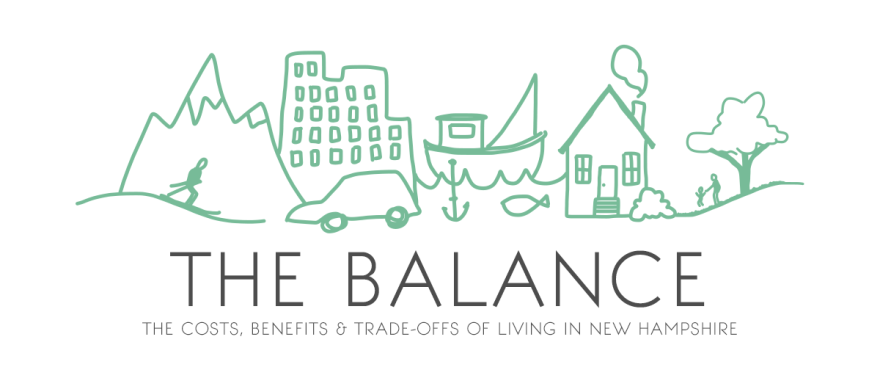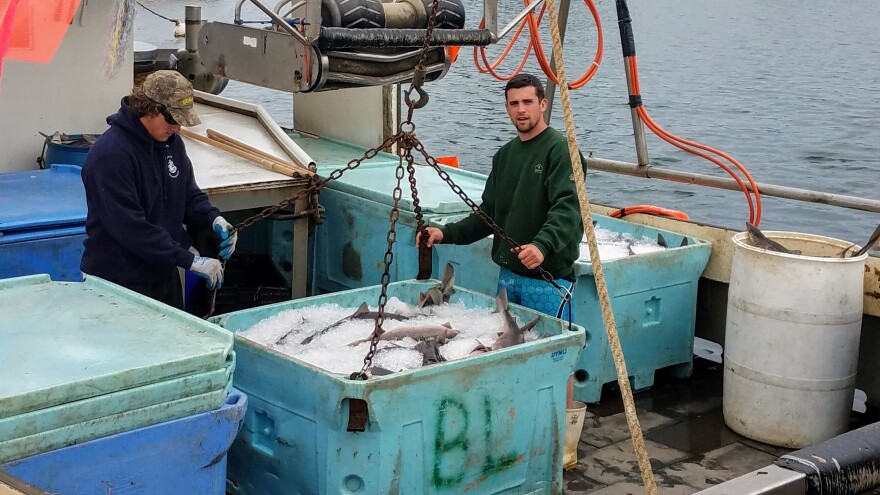It’s a feeling many in today’s economy can relate to: starting out in a career is just harder than it used to be.
One group that’s very familiar with that idea is commercial fishermen. In New Hampshire, dozens of boats used to head out every morning to fish for cod and haddock. Today that number is down to just a handful.
For our series The Balance, which looks at the cost of living in New Hampshire, Jason Moon tells us about two young fishermen who, in spite of the odds, are trying to live a vision of an iconic New England profession.
Click here to see all the stories in the series, and to submit your questions about the costs and upsides of living in the Granite State.
It wasn’t always Zach Griggs’ plan to become a fisherman. Along the way, he tried other things, too.
“I went to community college for a year-and-a-half and I realized I don’t like book-work." says Griggs. "I realized I like working.”
But more than just working, Griggs realized he liked this kind of work. The way you get paid for exactly what you catch, the way each day is different.

“The sun rises every day but none of them are the same," says Griggs. "It’s like, every day you haul the nets, it’s not going to be the same thing as you hauled yesterday. When I did dry wall, I knew I had screw every day and a screw-gun ‘bzzz, bzzz, bzzz.’ Miserable.”
Griggs is 28, but he’s already spent about 8 years in the fishing industry.
About four months ago, he decided to make a bet on staying in for even longer. He took out a loan and bought a boat, the Bridget Leigh. It’s a 44-foot white fishing boat that Griggs knows well. He’s been a deckhand on it for the past 6 years.
Turns out, being a New Hampshire fisherman isn't what it used to be.
It should be an exciting moment – striking out on his own like this. But sitting in his new captain’s chair, Griggs sounds deflated.
“This is about what it’s good for, right here, right now, without permits," says Griggs, "Sitting on it, hanging out. That’s pretty much all it’s been doing.”
Turns out, being a New Hampshire fisherman isn’t what it used to be.
On a recent night at the Rye Harbor, I met with Griggs and a couple of friends onboard the Bridget Leigh to talk about the state of New Hampshire’s fishery.
One of those friends is Lucas Raymond. At 25 years old, Raymond is New Hampshire’s youngest commercial fisherman. And like Griggs, he can’t imagine doing anything else.
“I would like to fish for the rest of my life," says Raymond. "I love it and I think it’s great to feed people local, day-boat fish, fresh.”

Raymond is a deckhand on one of New Hampshire’s few remaining groundfishing boats, the Sweet Misery. It’s a name that seems to capture what it’s been like for Griggs and Raymond as they try to get started in an industry that’s disappearing all around them.
In recent years, a lot has gone wrong for New England fisheries.
Competition from global markets has increased just as fish stocks in the Gulf of Maine have plummeted.
In 2014, the National Oceanic and Atmospheric Administration announced the amount of cod in the Gulf of Maine had hit the lowest point ever recorded - just 3% of the target population.

In response, federal regulators clamped down on the number of fish that fishermen are allowed to catch.
But many fishermen, Griggs and Raymond included, just don’t buy it. They say when they’re on the water they see plenty of cod.
“We definitely believe we see different things than what the government says they see," says Raymond. "I understand erring on the side of caution with anything like that. But it’s gotten to the point that you can’t work because of it. You can’t get into it and even when you’re in it, a lot of guys have failed.”
Griggs says the regulations are the biggest challenge for him right now. The costs of adhering to all the federal rules can reach into the tens-of-thousands of dollars for a fisherman who’s just starting out.

That’s part of what has led to a big decline in the number of groundfishermen in the state. Today only about ten groundfishing boats are left in New Hampshire, only three of those fish full time.
There’s hope that catch limits will be raised before long. But in the meantime, Griggs still has boat payments to make - $1600 a month.
To get by, he works as a deckhand on other boats and lives onboard the Bridget Leigh in warm weather to save on rent.
“Everybody thinks I’m crazy for what I did: buying a boat...which I probably am," says Griggs. "I don’t think anyone wants to see me fail, but I think everybody expects it cause that’s just the way things are these days.”
Chart: Over the past several years, more and more groundfishermen in N.H. have decided to give up their permits and get out of the business altogether.
Note: boats can own multiple permits each. Source: NOAA GARFO permits database
For all the obstacles they face, Griggs and Raymond do have some people in their corner.
Matt Louis is chef and owner of a chic tapas restaurant called Moxy in downtown Portsmouth. He says if the New Hampshire fishing industry dwindles to nothing, it would be a serious blow to the city’s prosperous restaurant scene.
“It would be very peculiar that we have this beautiful coastal town right on the water but yet none of the fish being consumed right on the water came from here," says Louis. "I mean that’s just a complete upside-down. If that were to happen, and the reality is, if we’re not careful, that could happen.”
'We definitely believe we see different things than what the government says they see...I understand erring on the side of caution with anything like that. But it's gotten to the point that you can't work because of it.'
Louis says it’s up to local restaurateurs to do what they can to support the fishery.
Back on the Bridget Leigh, Griggs and Raymond don’t seem like they’re on a crusade to save way of life, they’re just trying to start their own.
“I didn’t start fishing with the idea that I was going to work for somebody for the rest of my life," says Griggs.
"I wanted this boat, I wanted the chance, and I said before: I may fail, and I know everyone’s expecting that, but it won’t be because I didn’t try.”
As our conversation on the boat winds down, I turned to David Lippmeier, an older former fisherman who’s been sitting, quietly listening the whole time. I asked him what he thinks Griggs’ chances are.
“I’m real happy to see him make a go of it. He’s got a tough road ahead of him.”
As for whether he’ll make it? All Lippmeier would say about that is: he’s got the right attitude.








